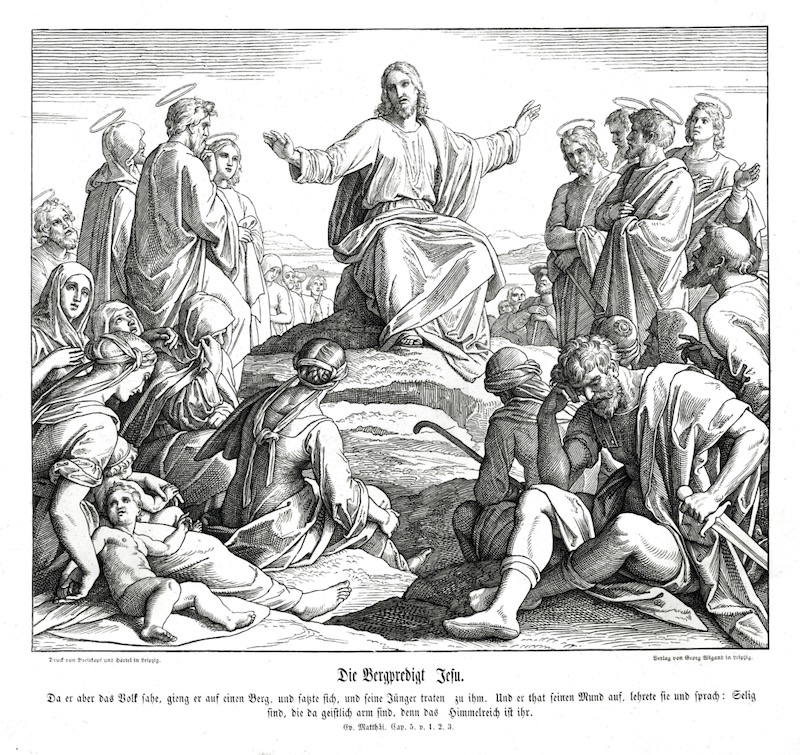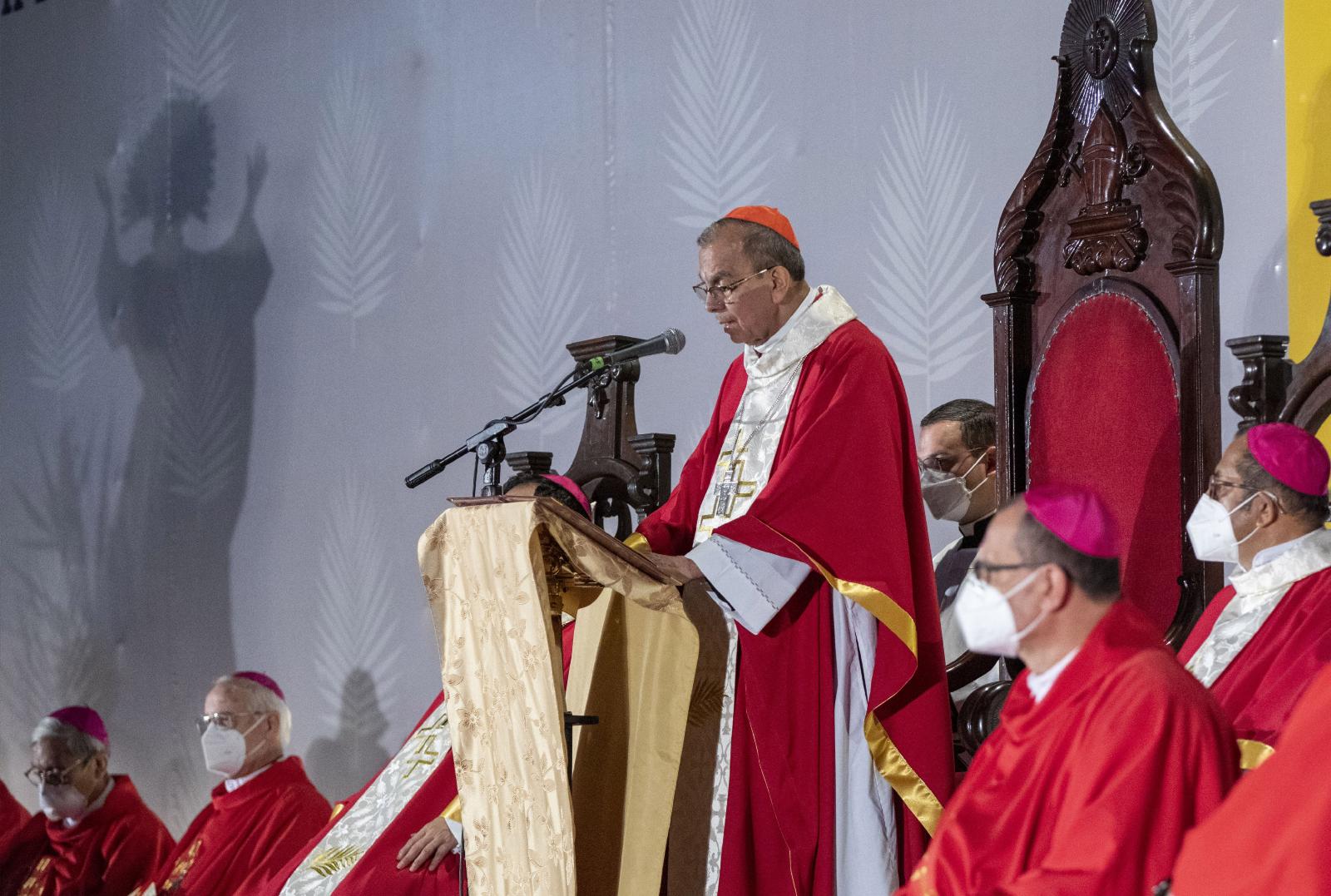Abridged version of the homily delivered at the beatification of Rutilio Grande, Cosme Spessoto, Manuel Solórzano and Nelson Lemus by Cardinal Gregorio Rosa Chávez, auxiliary bishop of San Salvador, on 22 January 2022
The image of the Divine Saviour of the World that crowns this sanctuary has today been given a simple thatched house, the humble home of our rural people, and invites us to feel one family that regains the strength to continue its journey. Like the displaced who return to their homes, the people of El Salvador see the martyrs who have today been registered in the list of the blessed an image of their own story, marked by joys and hopes, moments of sadness and moments of anguish. On this journey they have felt the Lord at their side, both in the hard moments and in the moments of joy. As the psalm says, “They who go out in tears, bearing the seed for sowing, shall come home with shouts of joy, bringing their sheaves with them.” Today is a glorious day because we are bringing in the harvest.
Who are we who are here today? We are an image of the whole Salvadoran people and have come from all corners of the country. There are working men and women from the rural areas who exult with joy to see that the Church recognises the holiness of those who gave their lives in their service. There are also representatives of the communities to whom Friar Cosme and Fr Rutilio ministered. We have with us – in the figures of Manuel Solórzano and the young Nelson Rutilio – representatives of that “great multitude which no-one could count”, that is, of the countless anonymous martyrs that form part of that symbolic number of 75,000 dead whom we have mourned during the fratricidal struggle that bled us dry for twelve years and ended happily when the opposing parties signed the peace accords.
To help us understand what it means to say that the Church in El Salvador is a Church of martyrs, we have listened to a text from the book of Revelation. The author of this sacred book contemplates “a great multitude that no one could count, from every nation, from all tribes and peoples and languages, standing before the throne and before the Lamb, robed in white, with palm branches in their hands” (Rev 7.9). All those who make up this great multitude have something in common: they all “have come out of the great ordeal; they have washed their robes and made them white in the blood of the Lamb”(Rev 7.14).
Of the four martyrs of El Salvador who have just been beatified we can also say in the words of Revelation 7.14 that “they are those who have come out of the great ordeal and “have washed their robes and made them white in the blood of the Lamb”. Indeed, the fratricidal war in which by their martyrdom they “washed their robes and made them white in the blood of the Lamb” can be described as a “great ordeal” for our dear country… Like the martyrs of the book of Revelation the blood they shed, with which they sealed the supreme witness of their faith, mingled with that of all the innocent victims whose names are not even known. But God does know of their witness. This blood shed, united to that of Christ, is a source of hope for our people. In the first place, because in the person of the martyrs, God has vindicated all the innocent victims. Rutilio, Manuel, Nelson and Cosme give a name to all the innocent victims sacrificed on the sacrilegious altar of the idols of power, pleasure and money. The blood shed by our martyrs, associated with that of Christ’s sacrifice on the cross, is the seed of reconciliation and peace (cf Eph 2.14-16).
The hymns we have been singing reflect very well the rich legacy they have left us. Rutilio, when he restores dignity to the rural communities as they express their new awareness and commitment through the Maize Festival, makes us think of his beautiful parable of the table with a long tablecloth at which everyone has a place and “there is enough for all”. And we shall learn the hymn in honour of Friar Cosme, “martyr of reconciliation and peace”, when we sing: “Devoted to the eucharist, careful guardian of God’s house, the sick and needy always found support in you. Close to the people, mediator for peace, you went to death, a martyr, a servant of God.”
The “great ordeal” took the form not only of violent death, but also of the unjust slanders spread about the majority of the victims. How much thousands of families suffered at the undeserved slander, defamation and dishonour that made their pain even harder to bear! The tongue, scripture says, can be used to praise God, but can also become a killer. The Kingdom of God is the complete opposite: it is light and truth, it is holiness and justice, it is justice, love and peace.
What the martyrs we venerate today did was to continue the work of Jesus, proclaiming the Kingdom and making it present in thirty years of humble ministry, in the case of Friar Cosme Spessotto, or in Fr Rutilio’s ministry, both in his work of priestly formation and in the contact with the harsh reality of the excluded rural communities who gradually discovered, in the light of the Gospel, what St Paul VI, on his visit to Colombia to open the work of the bishops at the Medellín conference, called “undeserved hardship” and warned against the temptation to resort to violence that produces outbursts of despair.
Each of them carried out his mission with very original features.
We are a Church of martyrs, but we are quite passive: we are not fully aware of the treasure we carry in vessels of clay. What Pope Francis said in Kampala, Uganda in 2015 is true for us too: “Ask for the grace of memory. The blood of the Ugandan Catholics is mixed with the blood of the martyrs. Do not lose the memory of this seed so that you can continue to grow.”
I pray to the Lord that this celebration may wake us up and set us on the road. Memory will lead us to faithfulness, that is, to the path of holiness. But memory and faithfulness are only possible with prayer.
The first urgent task, then, is to recover memory.
In Latin America memory is about living the Gospel and the teaching of the Church especially since the Second Vatican Council and the general assembly of the bishops of our continent in Medellín in 1968. A clear example is Rutilio Grande. After taking the course at the Latin American Pastoral Institute in Ecuador and sharing the experience of work with rural communities and indigenous people in the diocese of Riobamba in the time of Bishop Leonidas Proaño, he returned to our country with a clear and unwavering option for the poor. He heads the list of our martyrs. He was followed by 20 priests, three women religious and a US lay missionary and hundreds of anonymous martyrs. The most illustrious of the pastors is of course Archbishop Romero, but we cannot fail to mention another bishop, Roberto Joaquín Ramos, murdered in June 1993. The presence of two laypeople – Manuel Solórzano and Nelson Rutilio Lemus – are like a window through which we can glimpse the reality of “a great multitude that no-one could count” (Rev 7.9).
Our martyrs can help us to recover memory and hope so that we do not give up on the dream of a country reconciled and at peace, a country such as our God wants, just, fraternal and in solidarity. For that we have to recover the spirit of the Peace Accords and the road map plotted in them.
I only met Rutilio once, when he arrived at the seminary and asked me to show him the casks of wine that were used for mass all over the country. In our brief conversation he told me that his father was a wine-maker and that wine is a living organism. To illustrate this he reminded me of the words of Jesus: “New wine is put in new wineskins.” Who would have thought that one Saturday, 12 March 1977, his blood would mingle with that of Jesus Christ, “the faithful witness”?
It fills me with joy to see how Fray Cosme’s parish community venerates him as a pastor who was not distinguished for his eloquence but, like his holy founder, “proclaimed the Gospel, if necessary with words”. The title “martyr of reconciliation and peace” emphasises very accurately his role as a faithful follower of Jesus. In the din of war he did not shun danger or stop defending his flock against the military authorities and the insurgent groups. And he met many young people on the battlefield and reminded them that he had baptised them and urged them to abandon the path of violence. His words were not heeded, but he made it clear that violence would never be the road to peace.
Archbishop Romero expressed the same idea at the requiem mass for Rutilio, Manuel and Nelson: “Real love is what led Rutilio Grande to his death, with two rural workers beside him. This is the Church’s love; it dies with them and with them it looks for the transcendence of heaven. It loves them, and it is significant that as Fr Grande travelled to his village, to bring the message of the mass and salvation, that is where he fell under a hail of bullets. A priest with his rural community, on his way to his village to identify with them, to live with them, not a revolutionary dream, but a dream inspired by love, because it is love that inspires us, brothers and sisters.
“Who knows? The criminal hands that have already been excommunicated may be listening to my words on a radio in their hiding-place, listening with their consciences. We want to tell you, criminal brothers, that we love you and that we are asking God to make your hearts repent, because the Church is incapable of hate, has no enemies. If it has enemies, it is people who have proclaimed themselves its enemies. But the Church loves them and dies with the words of Christ on its lips: “Father, forgive them, for they do not know what they are doing.”
Friar Cosme left us the same lesson, when in his brief will, which he asked to be opened “in the case of an unexpected death”, there is the text we all know: “I foresee that at any minute fanatical people may take my life. I ask the Lord that, if the moment comes, he may give me the strength to defend the rights of Christ and the Church. Dying as a martyr would be a grace I do not deserve… In advance I forgive and ask the Lord to convert those who kill me.”
Pope Francis expresses these ideas in different ways: a Church that “lives the sweet joy of evangelising”, an outgoing Church, a Church that goes out on to the street, running the risk of having an accident; a Church that is a “field hospital”; a Church that shows the face of God, close, tender and merciful; a Church that makes present the Kingdom of God, a Church where everyone feels “at home”, “a poor Church for the poor”.



 Loading ...
Loading ...
What do you think?
You can post as a subscriber user ...
User comments (0)